A Year with Peter Drucker
52 Weeks of Coaching
for Leadership Effectiveness
by Joseph A. Maciariello
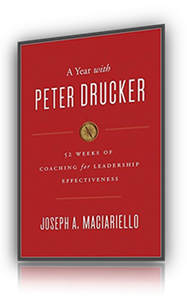
Amazon link

The brain can only see
what it
is prepared to see
«§§§»
To know something,
to really understand
something important,
one must look at it
from sixteen different angles.
People are perceptually slow,
and there is no shortcut
to understanding;
it takes a great deal of time. continue
«§§§»
Your thinking, choices, decisions
are determined by
what you’ve
“SEEN”
“Once perception
is directed in a certain direction
it cannot help but see,
and once something is seen,
it cannot be unseen”
«§§§»
Being prepared for what comes next — and there’s no one to ask
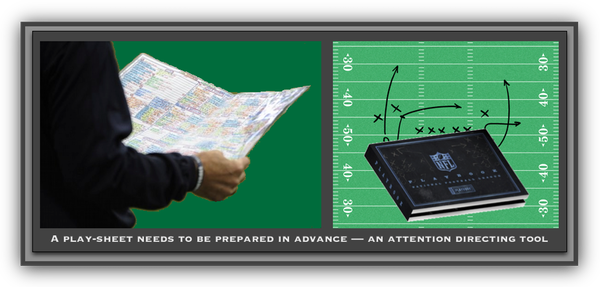
Work has to make a life
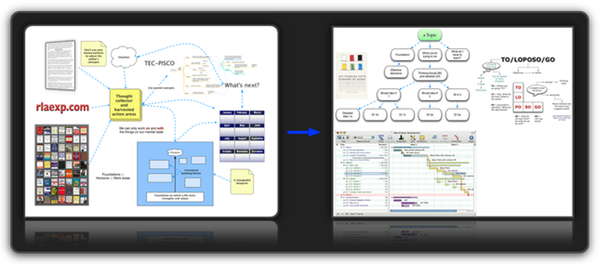
finding and selecting the pieces of the puzzle
#Note the number of books about Drucker ↓
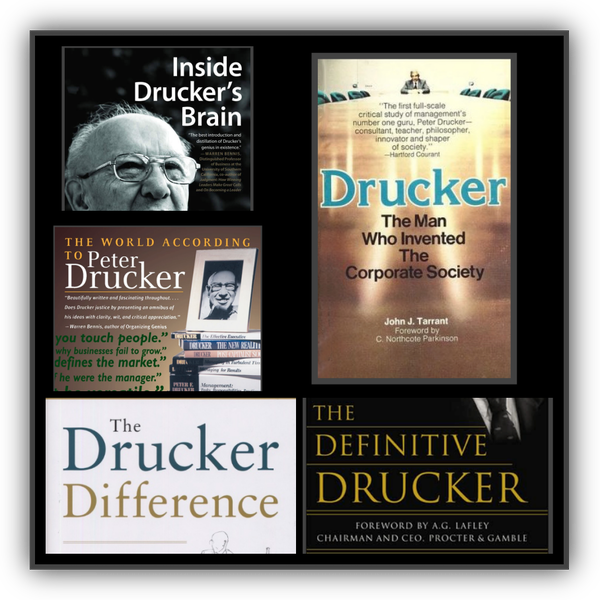
My life as a knowledge worker
Drucker: a political or social ecologist ↑ ↓
“I am not
a ‘theoretician’;
through my consulting practice
I am in daily touch with
the concrete opportunities and problems
of a fairly large number of institutions,
foremost among them businesses
but also hospitals, government agencies
and public-service institutions
such as museums and universities.
And I am working with such institutions
on several continents:
North America, including Canada and Mexico;
Latin America; Europe;
Japan and South East Asia.
Still, a consultant is at one remove
from the day-today practice —
that is both his strength
and his weakness.
And so my viewpoint
tends more to be that of an outsider.”
broad worldview ↑ ↓
Most mistakes in thinking ↑ are mistakes in PERCEPTION: …
Seeing only part of the situation;
Jumping to conclusions;
Misinterpretation caused by feelings …
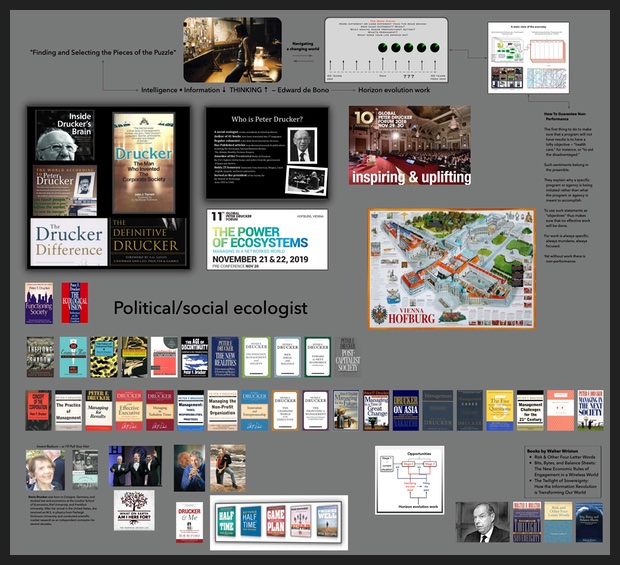
#pdw larger ↑ ::: Books by Peter Drucker ::: Rick Warren + Drucker
Books by Bob Buford and Walter Wriston
Global Peter Drucker Forum ::: Charles Handy — Starting small fires
Post-capitalist executive ↑ T. George Harris

Your thinking, choices, decisions
are determined by
what you’ve “SEEN”
“Once perception is directed
in a certain direction
it cannot help but see,
and once something is seen,
it cannot be unseen”
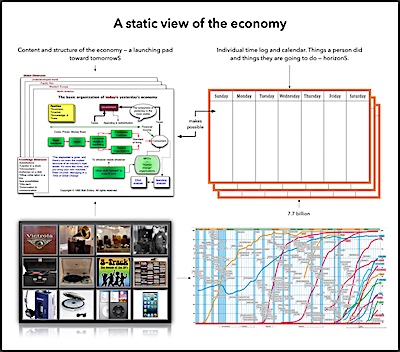
The speed of product and technology adoption


Work has to make a life
If you don’t design your own life
someone else will do it for you

↑ The Drucker Lectures:
Essential Lessons on
Management, Society, and Economy
↓
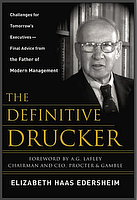
The Definitive Drucker:
Challenges For
Tomorrow's Executives
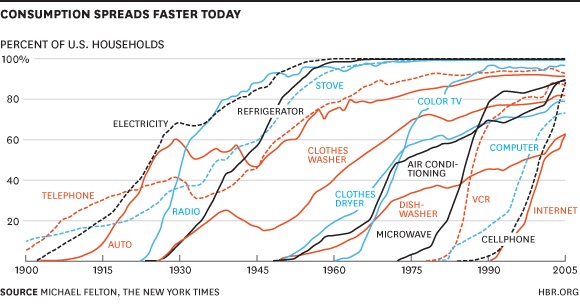
“More detailed map” ↑
About technology
A Year with Peter Drucker:
52 Weeks of Coaching
for Leadership Effectiveness
The Five Most Important Questions
You Will Ever Ask
About Your Nonprofit Organization
Danger of too much planning
Learning to Learn
↑ ecological awareness → operacy —
the skills of doing
The memo “THEY” don’t want you to SEE
“The world around is full of a huge number of things
to which one could pay attention.
But it would be impossible
to react to everything at once.
So one reacts only to
a selected part of it.
The choice of attention area
determines the action or thinking that follows.
The choice of this area of attention
is one of the most fundamental aspects
of thinking.” — Edward de Bono

As life unfolds
there are parallel events
evolving
and interacting
with other evolving events.
Carry on/connect up?
Build on or take off from?

Richard N. Haass
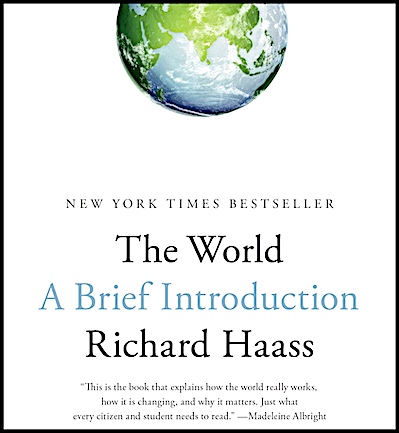
#ptf The World: A Brief Introduction — Amazon #ad ↓
Preface on steriods pdf
PART I: THE ESSENTIAL HISTORY :::
From the Thirty Years War to the Outbreak of World War I (1618-1914) :::
The Long Shadow: the Great War and the Twentieth Century :::
From World War II Through World War I (1914-1945) :::
The Cold War (1945 - 1989) ::: The Post-Cold War Era (1989 -Present) :::
PART II: REGIONS OF THE WORLD ::: Europe :::
East Asia and the Pacific ::: Asia :::
The Middle East ::: Africa ::: The Americas :::
PART III: THE GLOBAL ERA ::: Globalization :::
Terrorism and Counterterrorism :::
Nuclear Proliferation ::: Climate Change ::: Migration :::
The Internet, Cyberspace, and Cybersecurity :::
Global Health ::: Trade and Investment :::
Currency and Monetary Policy ::: Development :::
PART IV: ORDER AND DISORDER :::
Sovereignty, Self-Determination, and Balance of Power :::
Alliances and Coalitions ::: International Society :::
War Between Countries :::
Internal Instability and War Within Countries :::
The Liberal World Order ::: Preface
What thinking is needed?
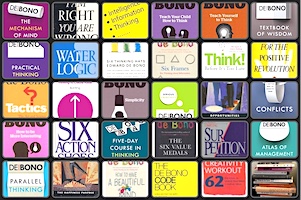

Management Challenges for the 21st Century and Managing in the Next Society
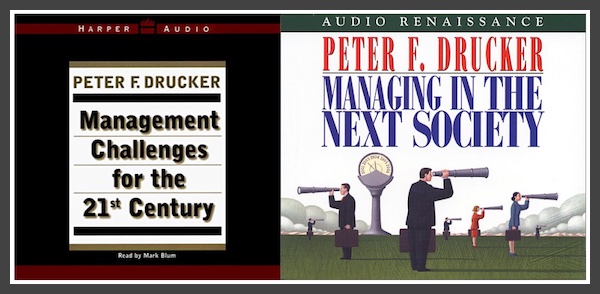

No two people ever read the same book
#dwrau #sda #mmit #fastp #adt
Most mistakes in thinking are mistakes in PERCEPTION: Seeing only part of the situation ::: Jumping to conclusions ::: Misinterpretation caused by feelings
Niccolò Machiavelli: 3 kinds of intelligence
and 9 action behaviors — Edward de Bono
Peter Drucker was THE original big thinker.
His ideas on management, innovation, leadership, effectiveness, and adapting to change formed the foundations of modern business (organization) wisdom.
Drucker was also a mentor to many notable leaders in business, government, and nonprofits, a role he valued tremendously.
In A Year with Peter Drucker, you will get to experience his mentorship process firsthand as his longtime collaborator Joseph A. Maciariello leads you from week to week, lesson to lesson, using previously unpublished material and selected readings from Drucker’s classic works to highlight critical lessons in leadership, personal effectiveness, and mission-driven strategy.
It features examples from the individuals and organizations that Drucker helped to guide to success, including his work assisting leaders in creating some of the world’s most influential religious organizations.
Joseph A. Maciariello has distilled the essence of Drucker’s personal mentorship program into an easy-to-follow 52-week course.
Each week contains a lesson, message, or anecdote taken from Drucker’s extensive body of published and unpublished work, moving from theme to theme throughout the year.
It also includes further readings and reflections on the week’s subject, and deep reflection questions—or quick brainstorming prompts—to help readers incorporate the message into their day-to-day work.
The year will cover the themes Drucker felt were most important to leadership development, such as
 Leaders Must Set Sights on the important and not the urgent. Leaders Must Set Sights on the important and not the urgent.
This is a key differentiator of moving from being a functionary to being a leader.
 Management is a Human Activity. Management is a Human Activity.
Process must serve people, in and out of the organzation.
 The Roadmap to Personal Effectiveness depends on a clear mission and on doing the right things, not just getting things done. The Roadmap to Personal Effectiveness depends on a clear mission and on doing the right things, not just getting things done.
 Management succession, especially to top positions, is a crucial decision and often a big gamble. Management succession, especially to top positions, is a crucial decision and often a big gamble.
It’s worth your time to get it right.
Maciariello, who worked alongside Drucker as a collaborator on a number of his books, delivers the ultimate Drucker companion—and the next best thing to being mentored by the legend himself.
“For almost nothing in our educational systems
prepares people
for the reality
in which they will
live, work, and become effective” — Druckerism
Knowledge
is useless
to executives
until
it has been translated
into deeds.

Contents
Dedication
Acknowledgments
Introduction
EFFECTIVE LEADERS
Week 1: Developing Leaders, Not Functionaries: Effective Leaders Get the Right Things Done and You Can Trust Them
Week 2: Questions to Ask Before Committing a Portion of Your Life to the Service of an Organization
MANAGEMENT IS A HUMAN ACTIVITY
Week 3: Three Fundamental Questions for a Functioning Society of Organizations
Week 4: Education and Management: Keys to Economic Development
Week 5: Management Rooted in the Nature of Reality
SETTING YOUR SIGHTS ON THE IMPORTANT, NOT THE URGENT
Week 6: Make the Important Rather Than the Urgent Your Priority in Life
Week 7. Manage in Two Time Dimensions
THE ROAD MAP TO PERSONAL EFFECTIVENESS
Week 8: Concentration
Week 9: Organize Work for Effectiveness
Week 10: Information Literacy for Executive Effectiveness
Week 11: Principles of Professional Leadership and Management
MANAGEMENT IN A PLURALISTIC SOCIETY OF ORGANIZATIONS
Week 12: Management: "The Governing Organ of All Institutions of Modern Society
Week 13: The First Job in Any Organization Is to Make Top Management Effective
Week 14: Control by Mission and Strategy, Not by Hierarchy
Week 15: Sustaining the Spirit of an Organization
NAVIGATING A SOCIETY IN TRANSITION
Week 16: Our Problems in the United States Are Social Problems
Week 17: Rough Period of Transition Ahead for America
Week 18: A Major Period of Transition for Society and Individuals
Week 19: Seeing the Future That Has Already Happened: Social and Demographic Changes Emerging in the United States
Week 20: Seeing the Future That Has Already Happened: Turmoil in Education
MAINTAINING YOUR ORGANIZATION THROUGH CHANGE
Week 21: Continuity and Change
Week 22: Systematic Abandonment and Innovation
Week 23: Using the Mission Statement to Create Unity in the Organization
Week 24: A Primer on Market Research of Noncustomers
Week 25: Phase Changes as Organizations Grow and Change
STRUCTURING YOUR ORGANIZATION
Week 26: Centralization, Confederation, and Decentralization
Week 27: The Networked Organization: A Model for the Twenty-First Century
MANAGING YOUR MEMBERS
Week 28: Managing the Superstar
Week 29: A Second Chance for Failures
Week 30: What Kind of Organizations Does America Need to Strengthen Society?
THE SUCCESSION DECISION
Week 31: The Succession Decision: Maintaining the Spirit of the Organization
Week 32: Planning for Succession in Organizations
LESSONS FROM THE SOCIAL. SECTOR ON THE POWER OF PURPOSE
Week 33: Mission
Week 34: Accommodating Various Constituencies in a Mission
Week 35: The Salvation Army
Week 36: Diffusion of Innovation-Public Schools
Week 37: Application of Peter Drucker's Methodology of Social Ecology:
DEVELOPING ONESELF FROM SUCCESS TO SIGNIFICANCE
Week 38: Pursuing Significance After Success
Week 39: Work in an Area of Your Unique Contribution
Week 40: Individuals May Need a Process to Help Them Move from Success to Significance
Week 41: Where Do I Really Belong?
Week 42: Halftime Is an Entrepreneurial Enterprise
Week 43: A Catalyst to Help People Manage Themselves and Move to the Second HaIf of Their Lives
CHARACTER AND LEGACY
Week 44: Our Society in the United States Has Lost Its Sweetness
Week 45: The Power of Purpose: Rick Warren on Peter Drucker
Week 46: The Stewardship of Affluence and the Stewardship of Influence
Week 47: Making Ourselves Useful to Others and to Ourselves
Week 48: What Do Leaders Stand For?
Week 49: You Become a Person by Knowing Your Values
Week 50: What Do You Want to Be Remembered For?
Week 51: "We Mentor … Because We Can Envision What a Person Can Become"
Week 52: Peter Drucker's Ten Principles for Finding Meaning in the Second HaIf of Life, As Reported by Bob Buford
Lessons Learned
Appendix
Notes
Bibliography
Index
About the Author
Also by Joseph A. Maciariello
Credits
Copyright
About the Publisher

Toward tomorrows

Toward unimagined futures
 The End of Economic Man: The Origins of Totalitarianism (1939) There’s still lots to learn here !!!! The End of Economic Man: The Origins of Totalitarianism (1939) There’s still lots to learn here !!!!
 The Future of Industrial Man (1943) The Future of Industrial Man (1943)
 The New Society: The Anatomy of Industrial Order (1950) The New Society: The Anatomy of Industrial Order (1950)
 Landmarks of Tomorrow (1957) Landmarks of Tomorrow (1957)
 The Age of Discontinuity (1968) The Age of Discontinuity (1968)
 The New Realities (1988) The New Realities (1988)
 Post-Capitalist Society (1993) Post-Capitalist Society (1993)
Moving beyond Capitalism
 Management Challenges for the 21st Century (1999) Management Challenges for the 21st Century (1999)
 Managing in the Next Society (2002); Last section originally published earlier in The Economist (http://economist.com/surveys/displaystory.cfm?story_id=770819) Managing in the Next Society (2002); Last section originally published earlier in The Economist (http://economist.com/surveys/displaystory.cfm?story_id=770819)
Drucker passed away in 2005
|
![]()
